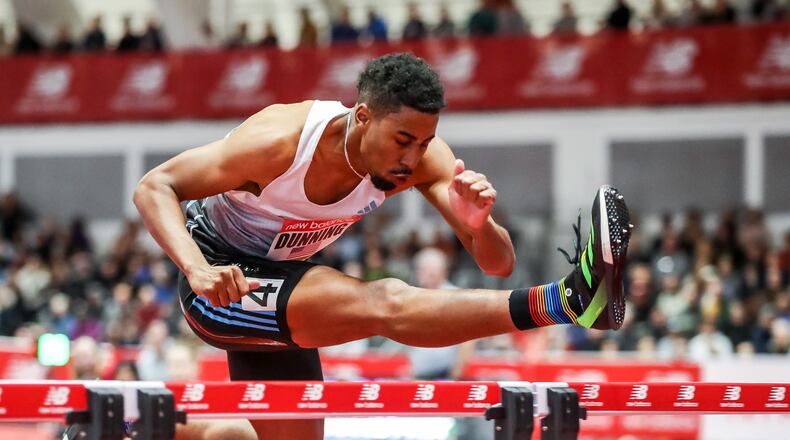The last time that Robert Dunning ran in a track meet in the Atlanta area was in 2015, after he graduated from Kennesaw Mountain High. He has since gone on to win a national championship in the 110-meter hurdles for Alabama and has competed in hallowed venues such as Hayward Field at the University of Oregon and Olympic Stadium in Berlin, where in 1936 Jesse Owens won four gold medals and defied the Nazi myth of Aryan supremacy.
“Very, very historic stadium,” Dunning said of the latter stadium. “I loved it.”
In a most distinctive format and environment, Dunning and several other world-class athletes will chase glory and prize money in the first-ever Atlanta City Games, held at Centennial Olympic Park. Three sprint events will be staged on a temporary 190-meter platform that crosses the park, with pole vaulting nearby. The other two events, runs of 600 meters and a mile, will also finish on the straightaway. It’s the first major international track meet held in Atlanta since the 1996 Summer Olympics.
“This is my first time ever being in a street meet, so I’m very excited,” Dunning said in an interview with The Atlanta Journal-Constitution. “I’m actually very happy it’s in my hometown.”
The meet, sponsored by Adidas and staged by the Atlanta Track Club, is expected to include winners of 12 world championships and Olympic gold medals, 12 Olympic medals and 29 world championship medals. (Not yet an Olympian, the 25-year-old Dunning is ranked 24th in the world in the 110 hurdles and has run the fifth fastest time of the year.) Two of the biggest names – 2020 Olympic medalist Gabby Thomas (a metro Atlantan until the age of 11) and two-time 200-meter world champion Noah Lyles – will run in a rare staging of the 150-meter dash. Track club executive director Rich Kenah said he was hopeful for a world-record performance.
“You don’t spend a year’s worth of planning and bring in all of these pieces to just jog down the track,” he told the AJC. “This is about speed and the best athletes matching up against each other.”
Adidas previously sponsored a similar meet in Boston, but Kenah persuaded the company that promoted and marketed it to bring it to Atlanta. (Kenah worked for that agency, Global Athletics and Marketing, and was represented by the company’s president when he was an Olympic-level runner.) While the club is perhaps most known for its annual The Atlanta Journal-Constitution Peachtree Road Race, Saturday’s meet is part of the club’s mission to bring world-class events to Atlanta. It follows the track club’s hosting the 2020 U.S. Olympic marathon trials in February 2020.
“To be honest with you, the concept was essentially born out of the need to bring world-class Olympic sprinting to the people rather than the people coming to it,” Kenah said.
The meet is free to the public and the setting – held in a city park – will allow fans a rare opportunity to appreciate world-class talent.
“Standing by the side of the track and seeing what a sub-10-second 100 looks like is something that you’ll never truly appreciate sitting in the stands or watching on television,” he said.
Credit: Paul Ward/Courtesy of Atlanta Track Club
Credit: Paul Ward/Courtesy of Atlanta Track Club
Adidas and the track club have a three-year agreement to hold the race at the park. Dignitaries expected to attend include track and field legends Edwin Moses, Jackie Joyner-Kersee and Gail Devers.
Before the elite competition begins at 5 p.m., the track club will hold a series of events for the public, including a 5K road race (all proceeds benefit the Ahmaud Arbery Foundation) in the morning and a mile race and youth meet in the afternoon. All events will finish on the straightaway platform. It was a focus of the club’s to have “an event like this that gives kids the opportunity to run on the same track as their Olympic idols do,” Kenah said.
The track itself is an engineering spectacle. The runway is elevated above a walkway that is essentially flat, but not at all flat by world-class track standards. For a track to be recognized as legitimate for setting world records, its grade can’t rise or descend more than 10 centimeters over 100 meters.
This week, a crew was constructing scaffolding beneath a metal platform to build a level course. Sections of the scaffolding rose as high as six feet upon an adjustable base at one point and as low as two feet near the finish line. An independent surveyor will be required to certify the course’s flatness.
The process is “extremely difficult,” according to David Katz, one of the track world’s premier technical officials (he described himself as “an international technology nerd” in Atlanta this week for the meet).
Runners will sprint past the park’s fountains and between two of the iconic light towers.
“We’d like to say that this is the center of all things running this weekend, and from a sprinter perspective, it is,” Kenah said.
About the Author
The Latest
Featured




